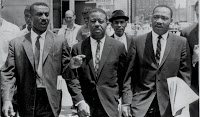
The MCRC (Maryland Consumer Rights Coalition) - which advances and protects the interests of Marylanders through research, education and advocacy - is showing an interesting new free film on financial fraud in Maryland. As their press release reports:
"These are tough times for hardworking Marylanders. Many are just a divorce, a medical injury, or a job loss away from poverty. MCRC has captured some of their stories in “Stealing Trust,” our powerful new documentary about Maryland victims of financial fraud. Join us to see the film during our Fall film series. Screening dates:
Tues. Oct. 4 at 6 p.m.
Kittleman Room (Duncan Hall, Room 100)
Howard Community College
10901 Little Patuxent Parkway, Columbia, MD.
Co-sponsored by Howard Community College’s Office of Student Life and Howard County’s Office of Consumer Affairs.
Thurs. Oct. 6 at 6:30 p.m.
La Plata United Methodist Church
3 Port Tobacco Road, La Plata, MD
Co-sponsored by Lifestyles of Maryland, Inc.
Tues Oct. 18 at 7 p.m.: Special Screening featuring remarks by Congresswoman Donna F. Edwards (D-4th)
Oxon Hill Public Library
6200 Oxon Hill Road, Oxon Hill, MD.
At the Oct. 18 event, Rep. Donna F. Edwards will provide opening remarks on the importance of protecting working families in tough times. The screening is co-sponsored by State Sen. Joanne Benson, Del. Aisha Braveboy, AARP Maryland, Councilman Obie Patterson, the Prince George’s County Dept. of Family Services and Advisory Committee on Aging and the Psi Epsilon Omega chapter of the Alpha Kappa Alpha Sorority. If you would like to attend a screening, please RSVP to Franz@marylandconsumers.org.
To learn more about the film, read some of the rave reviews, and download flyers for the screenings:
http://www.marylandconsumers.org/Advocacy/MCRCDocumentaryFilmStealingTrust/tabid/153/Default.aspx
MCRC will be scheduling more screenings later in the Fall and Winter. If you or your organization would like to host a screening or a house party, please contact Franz@marylandconsumers.org."
web
www.marylandconsumers.org
facebook
facebook.com/marylandconsumers
twitter
twitter.com/mdconsumers
blog
www.marylandconsumersblog.org/





